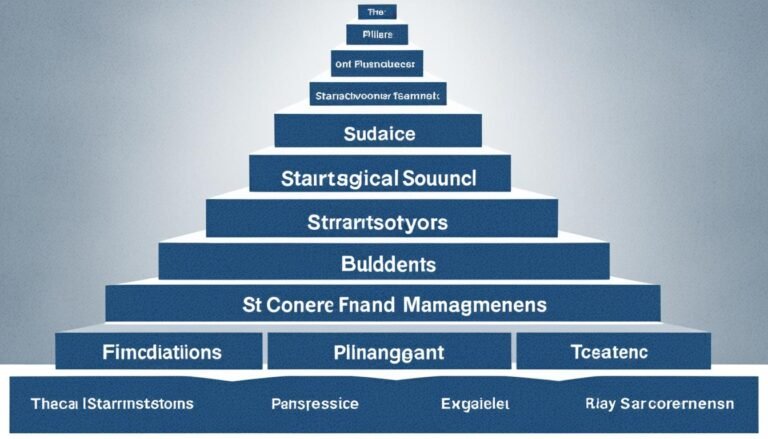What standards of ethics should managers uphold?
Did you know 58% of workers say their boss’s ethics affect if they stay or go?
Ethics in management is crucial for a company’s reputation and its ability to keep top employees. Managers are key in setting an ethical tone at work. They make sure the staff follows ethical standards.
Key Takeaways:
- Ethics in management has a direct impact on employee retention.
- Managers have the responsibility to set ethical standards and lead by example.
- Upholding high ethical conduct creates a positive workplace environment.
- Ethical management practices contribute to long-term organizational success.
- Attracting and retaining ethical employees is vital for business integrity and growth.
The Importance of Ethical Leadership in Management
Ethical leadership is key to making sure a company runs ethically. It influences how workers act and the overall values of the organization.
Managers show the way by doing what’s right. They encourage their teams to act with honesty and ethics. This shapes the company’s culture to be ethical.
When managers lead with ethics, their teams are more trustworthy and open. They make sure important values like honesty and fairness are followed. This helps build strong connections between managers and their teams.
“Ethics is knowing the difference between what you have the right to do and what is right to do.” – Potter Stewart
Good ethical leadership helps employees know the company’s goals and moral standards. It makes them see why it’s crucial to act with integrity.
Managers who follow ethical standards can lower the risk of ethical issues. They make the workplace positive and encourage employees to make the right choices.
Ethical leadership isn’t just a checklist of rules. It’s about using the best methods to grow a trustworthy, successful business that cares for its people and partners.
Benefits of Ethical Leadership in Management:
- Promotes integrity and ethical behavior
- Builds trust and transparency
- Fosters a positive work culture
- Enhances employee motivation and loyalty
- Reduces ethical and legal risks
- Boosts employee morale and job satisfaction
- Attracts ethical customers, partners, and investors
- Drives organizational success and sustainability
Principles of Ethical Business Practices
To keep ethical standards high, certain principles are key in business. These guide how organizations behave well and encourage good ethics in their environment.
Honesty
Being honest is critical in the business world. It means always telling the truth, sharing accurate info, and keeping promises.
Fairness
Treating everyone equally is part of ethical behavior. It helps ensure that decisions are fair and bias-free, making the workplace just.
Leadership
Good leaders promote ethical actions among their team. They live by high ethical standards, setting a good example for others.
Integrity
Integrity is fundamental in business ethics. It’s about following ethical values, match actions with words, and keeping high moral grounds all the time.
Empathy
Empathy is crucial for acting ethically. It means understanding others’ feelings and viewpoints and making compassionate decisions.
Respect
Respecting others is the foundation of ethical actions. It means treating people with dignity, appreciating differences, and respecting personal freedom.
Responsibility
Being responsible involves own up to your actions. Make choices that help everyone and own the outcomes of your decisions in ethical ways.
Loyalty
Loyalty is about supporting your organization ethically. It means putting their needs first and avoiding personal conflicts.
Compliance
Following laws and rules is key for ethical business. It keeps organizations on the right side of the law and ethical practices.
Accountability
Being accountable means taking responsibility for what you do. It’s about owning up to mistakes, learning from them, and fixing them.
Transparency
Being clear and honest in communication is crucial for ethical standards. This means sharing information openly, keeping communication lines open, and being upfront.
Environmental Commitment
Showing care for the environment is an ethical must. It involves efforts to reduce harm, conserve resources, and support green initiatives.
Following these principles helps build a solid ethical culture. This earns trust from stakeholders and helps build a better future for all.
Creating a Culture of Ethical Behavior
Managers play a crucial role in making sure a company acts with ethics. It’s up to them to set up a culture where being ethical is the norm everywhere. This is done by setting ethical conduct standards and following managerial integrity best practices. Doing this helps make sure teams work with ethics that fit the company’s values.
To make a culture of ethics, managers must show the way. They should make choices and act in a way that shows the company values ethics. When employees see their leaders acting right, they’re more likely to do the same.
“The best way to lead is by example. Managers should demonstrate the desired behavior and hold themselves accountable to the highest ethical standards.”
Good communication is key for an ethical culture, too. Managers should tell everyone about the company’s ethics. They should make sure employees know and live by these rules. Having training sessions and talking about ethics often can help everyone stay on the right track.
Managers also need to make ways for workers to report bad behavior and get advice. This makes employees feel safe to speak up without being scared of what might happen to them.
For a culture that promotes ethics, managers should include ethics in how they check performance. They should reward those who act with good ethics. This shows everyone that the company truly values ethical behavior.
To wrap it up, managers are key to making an ethical company. They do this by setting standards, being an example, talking openly, and rewarding good behavior. This approach not only helps the company’s name but also its lasting success.
The Role of Codes of Conduct in Ethical Management
Codes of conduct are key in making sure people act ethically at work. They outline what behavior is right or wrong. These rules guide employees when facing tough ethical choices.
Why are Codes of Conduct Important?
These codes set the bar for good behavior at the workplace. They make sure everyone knows what’s expected. This helps build a company where doing the right thing is important to all.
“Codes of conduct establish the expectations and boundaries of ethical behavior within an organization.”
They help point employees in the right direction, especially in tricky moments. By considering how their choices affect others, they can act in ways that benefit the company and society.
Benefits of Codes of Conduct
Having clear codes brings many good things:
- Consistency: They keep everyone playing by the same ethical rules.
- Clarity: People know exactly what’s allowed and what’s not, avoiding misunderstandings.
- Accountability: Codes make sure people are responsible for their actions.
- Trust and Reputation: Following these standards helps the company gain trust and respect.
- Risk Mitigation: They also help the company spot and avoid legal and reputation risks.
Overall, codes of conduct are crucial for fostering ethical thinking at work. They lead employees to make decisions that respect the company’s values.
The table below shows what a good code of conduct looks like:
| Key Components of Effective Codes of Conduct |
|---|
| Clear statement of ethical values and expectations |
| Prohibition of unethical behavior and conflicts of interest |
| Guidance for decision-making in complex ethical situations |
| Reporting mechanisms for ethical concerns and violations |
| Consequences for non-compliance |
| Regular review and updates to reflect evolving ethical standards |

Codes of conduct are a must for keeping companies ethical. They give everyone clear rules to follow, ensuring fairness and integrity in decisions.
Benefits of Ethical Management Practices
Ethical management brings a lot of good to any organization. It shows dedication to honesty and builds trust. By following the right ethical paths, a company gathers good people and minimizes many risks.
An immediate advantage is a better reputation. Ethical companies win the trust of their customers, suppliers, and investors. A good standing leads to more loyalty, a positive brand image, and a strong edge over competitors.
Another plus is attracting and keeping ethical staff. When ethics is a top value, it becomes part of the company’s soul. Good employees stay longer, making the workplace better. Hiring such people improves the success and image of the organization.
Being ethical also stops a lot of possible problems. By obeying the law, companies dodge legal issues. They also cut the odds of bad press, lawsuits, or fines. Following high ethical standards guides smart choices and helps avoid risks.
Plus, it boosts how happy and motivated employees are. Workers love being part of a company that does the right thing. They put more effort into their jobs, leading to a better workplace and better results for the business.
Focusing on ethics in the long run leads to overall success.
Such companies are well-respected by everyone they deal with.
Trust gained through ethical practices lays a solid path for growth. It attracts investors and encourages partnerships. Ethical companies often lead their field because they’ve won the trust of their community.
Summing up, ethical management benefits organizations in many ways. It boosts trust, keeps good people around, avoids problems, and makes everyone happier. The effects are not just within the organization but also in how the world sees it. Ethics are key to making a business thrive in the long term.
| Benefits of Ethical Management Practices |
|---|
| Enhanced company reputation |
| Build trust with stakeholders |
| Attract and retain ethical employees |
| Mitigate legal and ethical risks |
| Improved employee morale and satisfaction |
| Contribute to long-term organizational success |
Note: This image illustrates the benefits of ethical management practices.
Real-World Examples of Ethical Business Practices
Several companies have shown ethical business practices. They have truly embraced business ethics in management and the importance of integrity. These companies set a great example, showing how ethics can shape their success and perception.
Chick-fil-A has put millions into employee scholarships. This shows their strong support for their staff’s education and growth. It shows how much they care about ethical behavior and standing by their values.
McDonald’s has promised to only use cage-free eggs. This choice highlights their care for animals and the environment. It also relates to their belief in good business ethics and integrity, which many customers value.
Nike supported Colin Kaepernick’s protest for social justice. This was in line with the Black Lives Matter movement. Nike’s action showed their dedication to doing what’s right, even when it’s hard. This approach gained them respect and support from many.
https://www.youtube.com/watch?v=cDUsO-ARETw
These examples strengthen the idea that ethical values in business are crucial. They have helped build strong relationships with stakeholders. More importantly, they’ve shown that ethical behavior boosts a company’s image and finances. Focusing on ethics in management has significant benefits for both the company and society.
| Company | Ethical Practice |
|---|---|
| Chick-fil-A | Investing in employee scholarships |
| McDonald’s | Commitment to using cage-free eggs |
| Nike | Standing by Colin Kaepernick, aligning with the Black Lives Matter movement |
Professional Responsibility in Ethical Management
Ethical management means doing the right thing and being responsible. Managers lead by setting a good ethical example. They follow guidelines to make sure companies act ethically.
They have to know the rules and laws that apply. This helps them be ethical leaders and teach others to do the same. Being a good role model encourages everyone to act ethically.
“Ethics is not just a box to check, but a way of doing business.”
Michael Josephson
Managers make sure the workplace is ethical and runs smoothly. They set clear rules, talk about why ethics matter, and make sure everyone follows them. This creates a work environment that values doing the right thing.
Advocating for Ethical Decision-Making
Managers should cheer for good choices throughout the company. They help employees understand what’s right and wrong. This makes the company a place where honesty and fairness come first.
Continuous Personal and Professional Development
Managers must keep learning to be good ethical leaders. They join in on extra programs to get better at managing ethics. Always learning helps them solve tough issues with the right approach.
| Benefits of Professional Responsibility in Ethical Management |
|---|
| 1. Fosters ethical behavior and corporate values integrity |
| 2. Builds trust and credibility within the organization |
| 3. Enhances employee morale and engagement |
| 4. Mitigates legal and ethical risks |
| 5. Attracts ethical talent and stakeholders |
| 6. Ensures long-term organizational success |
Ethical Leadership and Organizational Success
Ethical leadership is crucial for a company to do well. When leaders act ethically and follow ethical rules, it builds a good workplace. This helps keep employees happy and motivated. It also boosts trust with customers. And it draws in ethical partners and investors. All of this leads to the company’s long-lasting success.
Companies guided by ethics see happier and more involved workers. Ethical leaders show their teams the right path by being honest and responsible. They talk openly, treat staff well, and push for teamwork.
This kind of leadership makes the workplace fair and trusting. Workers feel important and stay dedicated and excited. They work better and come up with new ideas. Ethical leaders care about their team’s well-being. They help with work-life balance and offer chances for personal growth. This all helps the company succeed.
Moreover, following ethical rules boosts a company’s image. When leaders act with honesty and virtue, people trust and like the company more. This trust means customers stay loyal, view the brand positively, and respect it in the market.
“Ethical leadership is not just about following the rules; it’s about doing the right thing even when no one is watching.”
– Larry Page, Co-Founder of Google
Standing by ethical values helps attract like-minded partners and investors. These connections not only make the company stronger but also bring new opportunities.
| Benefits of Ethical Leadership |
|---|
| Enhanced employee loyalty and motivation |
| Increased customer trust and loyalty |
| Positive brand perception and reputation |
| Attracting ethical partners and investors |
| Sustainable and long-term organizational success |
To wrap it up, ethical leadership is key to a company’s success. When leaders act with ethics, everyone wins. The company grows, employees are happy, and everyone trusts the business more. This all makes the company a top player in the industry. Ethical leadership is essential for lasting growth and prosperity.
Promoting Ethical Management Through Education and Training
Teaching and training are key in spreading and keeping up ethical practices in companies. It helps staff and managers know good ethics and handle tough situations the right way. This boosts the sense of doing the right thing within a company.
Training keeps managers updated on what’s right and wrong in their field. It gives them the skills to make choices that are ethical and keep their company’s strong values. This keeps ethics at the heart of the company.
By training their team, companies make sure everyone knows what good ethics look like. This way, each employee knows how to act responsibly. It builds a culture where doing what’s right matters the most, from the top to the bottom.
Teaching and training also let people talk about the tough moral questions they face. They get to listen and learn from each other. This keeps everyone growing and always doing better with ethics at work.
Benefits of Education and Training in Ethical Management
Having these education and training programs brings many benefits:
- Raises awareness about good ethics in management.
- Helps in making better choices in tricky moral situations.
- Enhances the understanding of what’s right, according to the rules and within the company’s culture.
- Boosts the skills needed to do the right thing.
- Builds a place where acting ethically is central and expected of everyone.
This method makes sure companies are ready for tough ethical problems. It gives everyone the power to act with integrity. This is how ethics become the center of everything done in the company.
Education is the most powerful weapon which you can use to change the world. – Nelson Mandela
Nelson Mandela knew it best: education changes things for the better. By pushing for ethical management through teaching and training, places can make a real difference. They can make their work world and how others see them more ethical and responsible.
Conclusion
Keeping up with high ethics in management is key for leaders. It helps them make ethical decisions and guide others well. This involves following ethical conduct standards, promoting integrity, and being responsible professionally. These steps help leaders build a work setting that is positive and ethical. This, in turn, drives long-term success for their group.
Ethical ways of leading are good for everyone involved. They help build trust, a good name, and growth that lasts. These efforts also lift a company’s corporate values integrity and its standing in the industry.
Focusing on business ethics in management is important. It helps companies draw in and keep ethical staff, form solid bonds with honorable partners and investors, and grow a loyal group of clients. Following ethical standards doesn’t just mean following laws and rules. It also makes employees happier and more loyal to the company.
To wrap up, it’s key to adopt managerial ethics guidelines and make ethics in management a part of daily choices. This is how a company becomes not just profitable but ethical and thriving.
FAQ
What standards of ethics should managers uphold?
Why is ethical leadership important in management?
What are the principles of ethical business practices?
How can managers create a culture of ethical behavior?
What is the role of codes of conduct in ethical management?
What are the benefits of ethical management practices?
Can you provide examples of ethical business practices?
What is the role of professional responsibility in ethical management?
How does ethical leadership contribute to organizational success?
How can education and training promote ethical management?
How can managers ensure ethical leadership and decision-making?
Source Links
- https://online.marquette.edu/business/blog/what-are-the-12-ethical-principles-for-business-executives
- https://www.shrm.org/about/bylaws-and-code-of-ethics/code-of-ethics
- https://www.ifac.org/knowledge-gateway/building-trust-ethics/discussion/ethical-leadership-and-developing-code-conduct-organizations








